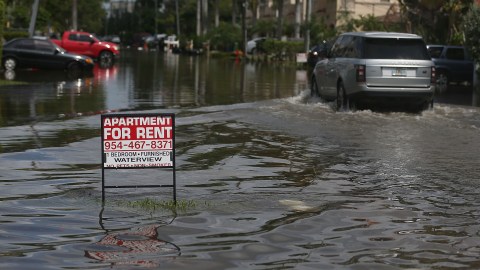What It Means When Reporters Tell Us Miami Is Drowning

Hal Wanless, a geologist at the University of Miami, told Elizabeth Kolbert that Miami Beach has less than 50 years left till it’s taken by the sea.
However, reports of Miami Beach’s flooding may not stop people from setting up shop there. A recent study published in Nature: Climate Changedemonstrates that the manner in which strange weather events are presented by the media greatly affects people’s reactions to living in an at-risk area, though not in the way you might expect.
“A common response is to assume that more information is better, and that providing summaries of risk levels will lead people to reduce their exposure to relevant risks,” researcher Ben Newell writes in a release about the work. “Data from field studies on non-climate-related disasters, however, point to the opposite effect.”
The researchers write that the “‘news reports’ of disaster occurrences can increase the tolerance for risk-taking (which implies that rare events are underweighted).” Reports of these events need to be given the weight that they deserve by informing the public of the bigger picture, telling audiences how often these events will occur in the future.
Discourse relating to climate change can often be misleading. It’s easy to manipulate data to look harmless — to treat these weather anomalies like, well, anomalies.
The only #climatechange chart you need to see. https://t.co/XWPo00GulS (h/t @powerlineUS) pic.twitter.com/QcrN2fCouT
— National Review (@NRO) December 14, 2015
But when we zoom in to see what's happening, we end up with something quite different.
@NRO @powerlineUS Let me zoom that in for some of your older followers: pic.twitter.com/OEVHxDXMjU
— Ryan (@RyanMcGarry) December 14, 2015
“To cope with its recurrent flooding, Miami Beach has already spent something like a hundred million dollars,” Kolbert wrote in her article for The New Yorker. “It is planning on spending several hundred million more. Such efforts are, in Wanless’s view, so much money down the drain. Sooner or later — and probably sooner — the city will have too much water to deal with. Even before that happens, Wanless believes, insurers will stop selling policies on the luxury condos that line Biscayne Bay. Banks will stop writing mortgages.”
Many believe in the power of human innovation. Necessity is the mother of invention, after all. Governments across the world have laid out bold plans to help divert the rising waters or stop them. But what about in a state where officials are confronted with such Orwellian rules that they're banned from using the term "climate change." How can an honest conversation about the rising sea levels happen when they're forced to refer to it as “nuisance flooding?”
As EPA Administrator Gina McCarthy explains, the government can only send signals of the coming trends. They alone cannot save the planet from these disasters.
***
Natalie has been writing professionally for about 6 years. After graduating from Ithaca College with a degree in Feature Writing, she snagged a job at PCMag.com where she had the opportunity to review all the latest consumer gadgets. Since then she has become a writer for hire, freelancing for various websites. In her spare time, you may find her riding her motorcycle, reading YA novels, hiking, or playing video games. Follow her on Twitter: @nat_schumaker
Photo Credit: Joe Raedle / Getty Staff





